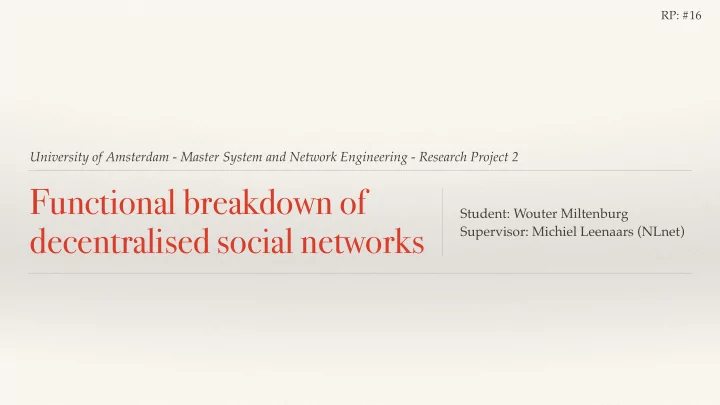

RP: #16 University of Amsterdam - Master System and Network Engineering - Research Project 2 Functional breakdown of Student: Wouter Miltenburg decentralised social networks Supervisor: Michiel Leenaars (NLnet)
RP: #16 Research Question ❖ What current implementation of a social decentralised network could be considered as an alternative to the current centralised social networks and could be offered as a service by hosting providers ? [1]
RP: #16 Research Questions Which functionalities exist in the typical social networks that we know nowadays? ❖ Which alternative open source projects are available that are mature enough and which ❖ provide these functionalities in a decentralised model? How do these different alternative open source projects differ from each other in a practical ❖ sense (e.g. security, standardisation, ID re-use, and scalability)? Which implementation is most suited to create a decentralised social network that can be ❖ provided by hosting providers as a service?
RP: #16 Related work D. Sandler and D. S. Wallach, Birds of a FETHR: open, decentralized ❖ micropublishing. T. Xu, Y. Chen, X. Fu, and P. Hui. Twittering by Cuckoo: Decentralized and ❖ Socio- aware Online Microblogging Services.
RP: #16 Related work ❖ P. Juste, D. Wolinsky, P. Boykin, and R. Figueiredo. Litter: A lightweight peer- to- peer microblogging service. T. Perfitt and B. Englert. Megaphone: Fault tolerant, Scalable, and ❖ Trustworthy P2P Microblogging. Thiel et al. A Requirements-Driven Approach Towards Decentralized Social ❖ Networks.
RP: #16 Approach and methods ❖ Analyse existing centralised social networks ❖ List their features and make a basic set of features ❖ Make an inventory of existing decentralised social networks ❖ Only analyse the solutions that meet requirements ❖ Analyse its features and inner working
RP: #16 First, why do people use Facebook? Based on the existing literature, we propose a dual-factor model of FB use. According to this model, FB use is primarily motivated by two basic social needs: (1) the need to belong , and (2) the need for self-presentation . – A. Nadkarni and S. G. Hofmann, Why do people use Facebook?
RP: #16 Facebook is also used ❖ For bridging (keeping in touch with persons far away) ❖ People post pictures to create their ideal image
RP: #16 Features ❖ Posting social updates ❖ Favourite an update ❖ (re-)sharing these updates ❖ Favourite a comment ❖ Commenting on updates ❖ Sending notifications ❖ Like an update ❖ Privacy
RP: #16 Out of scope ❖ masques ❖ Pixepark ❖ Jappix ❖ Maidsafe ❖ Avatar ❖ Elgg ❖ Lorea ❖ Ethereum ❖ Tonika ❖ Noosefero ❖ Themineproject ❖ Trsst ❖ Phoenix ❖ Buddypress ❖ Kopal ❖ Helloworld ❖ NXTmemo ❖ Meomni ❖ Tent.io ❖ Bitmessage ❖ Sone ❖ duuit ❖ Buddycloud ❖ Pond ❖ Secushare ❖ Higgins ❖ Libertree ❖ Kune ❖ OpenAutonomy ❖ ODS
RP: #16 Reasons ❖ Can not be used in a production environment ❖ Not broadly accessible ❖ Abandoned projects ❖ Other philosophy ❖ Missing cross-server message exchange
RP: #16 Implementations ❖ pump.io ❖ GNU social ❖ Friendica ❖ RedMatrix ❖ IndieWebCamp ❖ Movim ❖ Diaspora* ❖ rstat.us
RP: #16 Advanced privacy settings ❖ Offered by RedMatrix and Friendica ❖ RedMatrix provides 18 options ❖ Diaspora* ❖ Only has aspects ❖ GNU social seems buggy ❖ pump.io not really advanced
RP: #16 Identities ❖ Form of identity ❖ All use: username@host.com ❖ Proof of identity ❖ Friendica no signature ❖ pump.io OAuth signature does not cover body ❖ Others use Salmon Magic Envelope, HMAC or own system ❖ Nomadic identity
RP: #16 Encryption ❖ Only RedMatrix stores encrypted data ❖ Messages between servers are encrypted with ❖ RedMatrix, Diaspora* ❖ Friendica (if RINO enabled) ❖ End-to-end encryption only offered by RedMatrix
RP: #16 Messaging ❖ Message distribution ❖ Message consistency ❖ All implementations have consistency issues ❖ No message queue in: pump.io ❖ Message relay ❖ Not implemented in: pump.io, seems broken with GNU social
RP: #16 Administering, searching, and blocking ❖ SPAM ❖ A real issue with pump.io and GNU social ❖ Diaspora, users can be blocked ❖ Advanced options to protect yourself available in Friendica and RedMatrix ❖ Reputation system ❖ Only available in RedMatrix ❖ Directory server ❖ Friendica and RedMatrix
RP: #16 Hidden contacts ❖ Not everybody needs to know who you friends are ❖ Possible with Friendica, RedMatrix, and Diaspora*
RP: #16 Public poll ❖ RedMatrix: zotfeed ❖ pump.io: firehose ❖ Friendica and Diaspora*: Feed per user ❖ GNU social: public feed
RP: #16 Something different
RP: #16 IndieWebCamp ❖ Movement/community ❖ Guided by principles, one important one: users own their data ❖ Data is syndicated to silos ❖ POSSE, PESOS, PESETAS ❖ Red Wind and Known ❖ IndieAuth ❖ Webmention
RP: #16 Standardisation
RP: #16 Standardisation The nice thing about standards is that you have so many to choose from. –Andrew S. Tanenbaum
RP: #16 Standardisation ❖ Almost no interoperability, unless one uses plugins ❖ There are standards but used or implemented slightly different
RP: #16 Protocols ❖ DFRN ❖ Tent ❖ Zot2 ❖ Libertree ❖ OStatus (stack) ❖ DSNP ❖ WebFinger ❖ OpenBook ❖ Salmon ❖ Activity Streams ❖ PubSubHubbub ❖ Portable Contacts ❖ Webmention
RP: #16 Conclusion ❖ A variety of reasons why people use social networks ❖ Comment, like, favourite, and post ❖ Looked at GNU social, Diaspora*, Friendica, pump.io, and RedMatrix ❖ RedMatrix is most suited to be provided as an alternative
RP: #16 Recommendations ❖ Permanent usernames ❖ Have two usernames, lookup performed by WebFinger ❖ Message distribution ❖ Let friends share one’s data, use session key
RP: #16 Future work ❖ Deadlock ❖ Security ❖ Benchmark ❖ Stale data and accounts ❖ Proof of concept of suggestions
RP: #16 The End Questions? wouter.miltenburg@os3.nl
RP: #16 Credits ❖ [1]: http://www.rand.org/content/dam/rand/pubs/research_memoranda/ 2006/RM3420.pdf
Recommend
More recommend